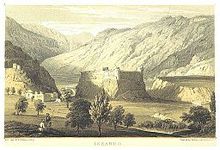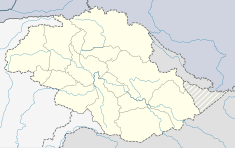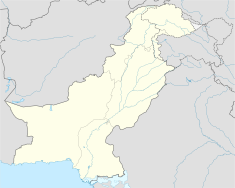Skardu Fort or Kharpocho (Balti: کھر فچو; Urdu: قلعہ سکردو), meaning The king of Forts, is a fort in Skardu in the Gilgit-Baltistan region of Pakistan. Australian mountaineer and film maker Greg Child writes that the fort is "perched above the junction of the rivers" and overlooks the Rock of Skardu.[1]
| Kharpocho Fort قلعہ کھرپوچو | |
|---|---|
 A view of fort from the foot of Mont Kharpocho | |
| Location | Skardu, Gilgit-Baltistan |
| Coordinates | 35°18′15″N 75°38′22″E / 35.30406°N 75.63957°E |
| Built | 16th Century CE |

History
editThe fort was built by king Ali Sher Khan Anchan at the end of the sixteenth century.[2] During his invasion of Baltistan in 1840, the Dogra general Zorawar Singh stormed it and razed it to the ground.[3][4]
Dogra Fort
editZorawar Singh had another fort built on level ground next to the Kharpocho hill. The fort remained till the First Kashmir War in 1947, when the local Pakistan aligned Gilgit Scouts laid a siege to it fighting against the Delhi aligned Jammu and Kashmir State Forces under the command of Lt. Col. Sher Jung Thapa. Thapa eventually surrendered after running out of rations.[5][6] [7]
See also
editGallery
edit-
Kharpocho fort
-
Entrance to the Skardu Fort
-
The ancient mosque at the fort
-
A 1924 photo of the Mosque in Skardu Fort
References
edit- ^ Greg Child. Thin Air: Encounters in the Himalayas. The Mountaineers Books. p. 72. ISBN 9780898865882.
- ^ Shiri Ram Bakshi. Kashmir: Valley and Its Culture. Sarup & Sons. p. 124. ISBN 9788185431970.
- ^ Shankar Prasad. The Gallant Dogras: An Illustrated History of the Dogra Regiment. Lancer Publishers. p. 18. ISBN 9788170622680.
- ^ GD Bakshi. Footprints in the Snow: On the Trail of Zorawar Singh. Lancer Publishers. p. 155. ISBN 9788170622925.
- ^ J Francis. Short Stories from the History of the Indian Army Since August 1947. Vij Books India Pvt Ltd. pp. 26–27. ISBN 9789382652175.
- ^ Jagjit Singh Arora. With Honour & Glory: Wars fought by India 1947–1999. Lancer Publishers. p. 13. ISBN 9788170621096.
- ^ B. Chakravorty. Stories of Heroism: PVC & MVC Winners. Allied Publishers. pp. 352–353. ISBN 9788170235163.

